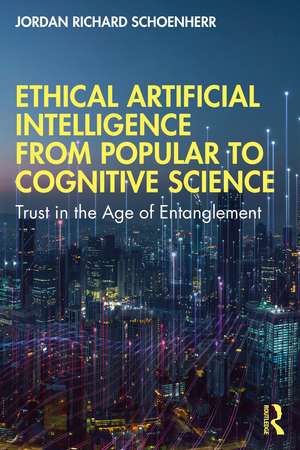Ethical Artificial Intelligence from Popular to Cognitive Science: Trust in the Age of Entanglement
Autor Jordan Richard Schoenherren Limba Engleză Paperback – 24 iun 2022
As humans become entangled in sociotechnical systems defined by human and artificial agents, there is a pressing need to understand how trust is created, used, and abused. Compounding the difficulty in answering these questions, stakeholders directly or indirectly affected by these systems differ in their motivations, understanding, and values. This volume provides a comprehensive resource to help stakeholders understand ethical issues of designing and implementing AISs using an ethical sensemaking approach. Starting with the general technical affordances of AIS, Dr. Jordan Richard Schoenherr considers the features of system design relating data integrity, selection and interpretation of algorithms, and the evolution processes that drive AISs innovation as a sociotechnological system. The poles of technophobia (algorithmic aversion) and technophilia (algorithmic preference) in the public perception of AISs are then described and considered against existing evidence, including issues ranging from the displacement and re-education needs of the human workforce, the impact of use of technology on interpersonal accord, and surveillance and cybersecurity. Ethical frameworks that provide tools for evaluating the values and outcomes of AISs are then reviewed, and how they can be aligned with ethical sensemaking processes identified by psychological science is explored. Finally, these disparate threads are brought together in a design framework.
Also including sections on policies and guideline, gaming and social media, and Eastern philosophical frameworks, this is fascinating reading for students and academics in psychology, computer science, philosophy, and related areas, as well as professionals such as policy makers and those working with AI systems.
| Toate formatele și edițiile | Preț | Express |
|---|---|---|
| Paperback (1) | 369.62 lei 6-8 săpt. | |
| Taylor & Francis – 24 iun 2022 | 369.62 lei 6-8 săpt. | |
| Hardback (1) | 895.78 lei 6-8 săpt. | |
| Taylor & Francis – 24 iun 2022 | 895.78 lei 6-8 săpt. |
Preț: 369.62 lei
Nou
Puncte Express: 554
Preț estimativ în valută:
70.73€ • 73.43$ • 58.98£
70.73€ • 73.43$ • 58.98£
Carte tipărită la comandă
Livrare economică 24 martie-07 aprilie
Preluare comenzi: 021 569.72.76
Specificații
ISBN-13: 9780367697983
ISBN-10: 036769798X
Pagini: 226
Ilustrații: 10 Tables, black and white; 3 Line drawings, black and white; 19 Halftones, black and white; 22 Illustrations, black and white
Dimensiuni: 156 x 234 x 12 mm
Greutate: 0.3 kg
Ediția:1
Editura: Taylor & Francis
Colecția Routledge
Locul publicării:Oxford, United Kingdom
ISBN-10: 036769798X
Pagini: 226
Ilustrații: 10 Tables, black and white; 3 Line drawings, black and white; 19 Halftones, black and white; 22 Illustrations, black and white
Dimensiuni: 156 x 234 x 12 mm
Greutate: 0.3 kg
Ediția:1
Editura: Taylor & Francis
Colecția Routledge
Locul publicării:Oxford, United Kingdom
Public țintă
Postgraduate, Professional, and Undergraduate AdvancedCuprins
Preface
1. Introduction
2. The Essence of AI: Features and Functions of Autonomous / Intelligent Systems
3. Social and Ethical Issues in AIS Popular Science Discourse.
4. Twilight of the Gods: Frameworks from Philosophical Ethical
5. Right-Thinking: Moral Competency and Ethical Sensmaking
6. Designing with Ethics: Ethics of AIS and Ethical AIS
7. Implementation and Trust in the Age of Entanglement
Appendix
1. Introduction
2. The Essence of AI: Features and Functions of Autonomous / Intelligent Systems
3. Social and Ethical Issues in AIS Popular Science Discourse.
4. Twilight of the Gods: Frameworks from Philosophical Ethical
5. Right-Thinking: Moral Competency and Ethical Sensmaking
6. Designing with Ethics: Ethics of AIS and Ethical AIS
7. Implementation and Trust in the Age of Entanglement
Appendix
Notă biografică
Dr. Jordan Richard Schoenherr is an assistant professor in the Department of Psychology (Concordia University), an adjunct research professor in the Department of Psychology and member of the Institute for Data Science (Carleton University), and a former visiting scholar at the US Military Academy (West Point). His primary areas of interest are decision-making, ethics, and learning with application in metacognition, the health professions, and the ethics of artificial intelligence.
Descriere
This book offers an interdisciplinary perspective on the ethics of autonomous and intelligent systems, and focuses on social cognition to understand ethical issues and decision making associated with AI, making it fascinating reading for academics, students, and professionals interested in the trust and ethics of AI.
